新人教版七年级下册Unit11-12单元教案
新人教版七年级英语下册Unit11教案
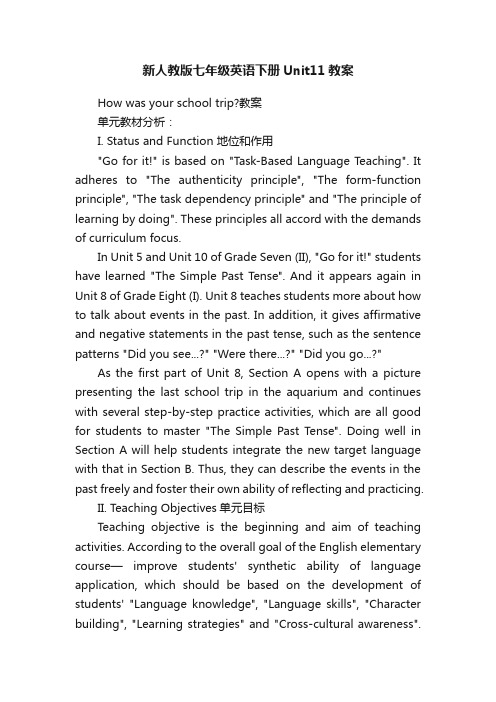
新人教版七年级英语下册Unit11教案How was your school trip?教案单元教材分析:I. Status and Function 地位和作用"Go for it!" is based on "Task-Based Language T eaching". It adheres to "The authenticity principle", "The form-function principle", "The task dependency principle" and "The principle of learning by doing". These principles all accord with the demands of curriculum focus.In Unit 5 and Unit 10 of Grade Seven (II), "Go for it!" students have learned "The Simple Past Tense". And it appears again in Unit 8 of Grade Eight (I). Unit 8 teaches students more about how to talk about events in the past. In addition, it gives affirmative and negative statements in the past tense, such as the sentence patterns "Did you see...?" "Were there...?" "Did you go...?"As the first part of Unit 8, Section A opens with a picture presenting the last school trip in the aquarium and continues with several step-by-step practice activities, which are all good for students to master "The Simple Past Tense". Doing well in Section A will help students integrate the new target language with that in Section B. Thus, they can describe the events in the past freely and foster their own ability of reflecting and practicing.II. Teaching Objectives单元目标Teaching objective is the beginning and aim of teaching activities. According to the overall goal of the English elementary course—improve students' synthetic ability of language application, which should be based on the development of students' "Language knowledge", "Language skills", "Character building", "Learning strategies" and "Cross-cultural awareness".The teaching objectives are described as follows:(I). Knowledge objectivesi. Master the simple past tense of regular and irregular verbsii. Recite the new words and expressions about the last school trip in the aquarium, including their pronunciation and intonationiii. Master the key sentences and learn how to talk about the past events(II). Ability objectivesi. Understand the two dialogues and gain the information to foster the listening skillsii. Use the discourse markers to organize sentences together to form a short story and interview others to foster the speaking skillsiii. Understand the reading material and find the answers on the wall to foster the reading skills iv. Write down the correct sentences to foster the writing skills1. 学习询问和谈论过去发生的事情。
新人教版七年级下第十二单元教案

教学过程一、复习预习教师引导学生复习上节课所学含be的一般过去时态结构,导入本节课内容,并检查本节课预习作业。
二、知识讲解知识点1: last的用法【考查点】一adj、最后的;上一个的如:last weekend上一周He has lived here for the last few years、过去的几年她一直住在这里。
【考查点】二v、持续如: Our holiday lasts 10 days、我们的假期持续十天The hot weather lasted until September、炎热的天气持续到九月。
知识点2:How interesting! 多么有趣呀!【考查点】一由"how"引导的感叹句:"how"意为"多么",用作状语,修饰形容词或副词(被强调部分)。
如果修饰形容词,则句中的谓语动词用系动词;如果how修饰副词,则句中的谓语动词用行为动词,这类句子的结构形式常就是: How+adj、(adv、)+主语+谓语+(it is)、如:①How cold it is today! 今天多么冷呀!②How nice the pictures are! 多么漂亮的图画呀!③How happy they look! 她们显得多么高兴呀!【考查点】二由"what"引导的感叹句:"what"意为"多么"用作定语,修饰名词(被强调部分),单数可数名词前要加不定冠词a/an,复数可数名词或不可数名词前不用冠词。
这类句子的结构形式常就是: what+(a/an)+adj、+n、+主语+谓语+(it is)、如: ①What a clever girl she is! 多么聪明的姑娘呀!②What an interesting story it is! 多么有趣的故事呀!③What good children they are! 她们就是多么好的孩子呀!知识点3 : camp by the lake 在湖边野营【考查点】一、camp v/n如:go camping 去野营summer camp 夏令营【考查点】二、by prep、如:by the river 在湖边by bus 乘车知识点3: work as a guide 做导游【考查点】as 为介词,意为“作为,像”as 与like 二者都就是介词,as表示“实际上就是……”,like 表示“实际上不就是……如:He talks to me as a teacher、He talks to me like my teacher、知识点4: a butrefly house with over 200 kinds of butterflies【考查点】介词with 之用法1、与、、、一起,偕同,与、、、如:She lives with her son、她与儿子住在一起。
(新)人教版新目标七年级英语下册(Unit11-Unit12)集体备课教案设计
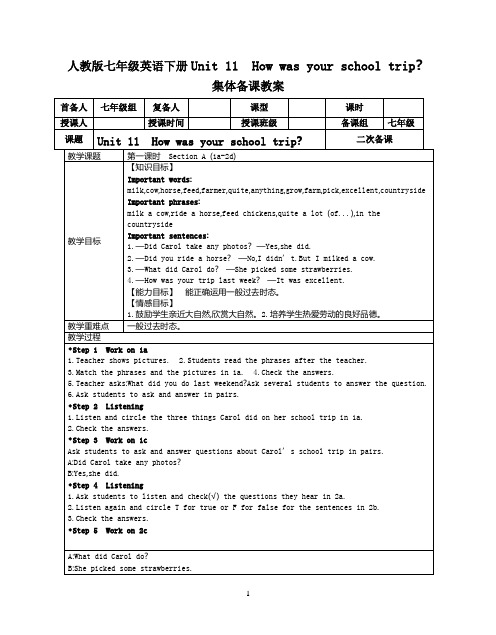
人教版七年级英语下册Unit 11How was your school trip?集体备课教案人教版七年级英语下册Unit 11How was your school trip?集体备课教案人教版七年级英语下册Unit 11How was your school trip?集体备课教案人教版七年级英语下册Unit 11How was your school trip?集体备课教案人教版七年级英语下册Unit 12What did you do last weekend?集体备课教案人教版七年级英语下册Unit 12What did you do last weekend?集体备课教案人教版七年级英语下册Unit 12 What did you do last weekend ?集体备课教案首备人 七年级组 复备人 课型 课时 授课人授课时间授课班级备课组七年级课题Unit 12 What did you do last weekend ?二次备课Keys :1.did ;stayed 2.are wearing 3.was 4.went 5.were ;was 教学反思教学课题 第三课时 Section B (1a-2c ) 教学目标 【知识目标】Important words : fly ,kite ,high ,ago ,India ,moon ,surprise ,snake ,move ,start ,jump ,wake ,forest ,into ,ear Important phrases : high school ,put up ,get a surprise ,shout to...,wake...up ,as a special gift ,tell stories ,know about Important sentences :1.But I was so tired that I went to sleep early.2.The next morning ,my sister and I got a terrible surprise.3.When we looked out of our tent ,we saw a big snake sleeping near thefire.4.We shouted to our parents to let them know about the danger.5.What lesson did Lisa learn from the weekend ?6.This woke the snake up and it moved into the forest near the lake. 【能力目标】能够正确运用一般过去时介绍周末生活。
人教版七年级英语下册第十一单元同步教学设计
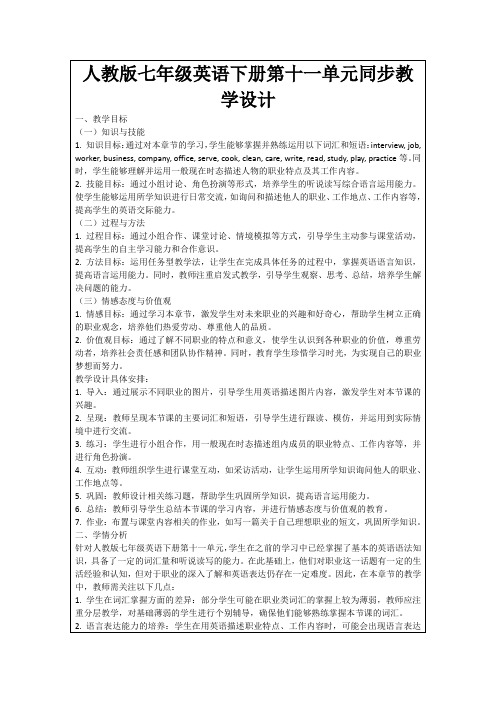
1.教学内容:对本节课的职业话题、词汇、语法等进行总结。
2.教学实施:教师引导学生回顾本节课所学内容,总结一般现在时态描述职业特点的用法,以及相关词汇和短语。
3.目标达成:通过总结归纳,帮助学生巩固所学知识,形成知识体系,提高他们的英语素养。
在教学过程中,教师应注重学生的主体地位,充分调动他们的学习积极性,关注学生的个体差异,进行分层教学。同时,教师要以人为本,关注学生的情感态度,培养他们正确的价值观。通过本节课的学习,使学生能够熟练掌握职业相关词汇,提高英语听说读写综合能力。
3.练习:学生进行小组合作,用一般现在时态描述组内成员的职业特点、工作内容等,并进行角色扮演。
4.互动:教师组织学生进行课堂互动,如采访活动,让学生运用所学知识询问他人的职业、工作地点等。
5.巩固:教师设计相关练习题,帮助学生巩固所学知识,提高语言运用能力。
6.总结:教师引导学生总结本节课的学习内容,并进行情感态度与价值观的教育。
人教版七年级英语下册第十一单元同步教学设计
一、教学目标
(一)知识与技能
1.知识目标:通过对本章节的学习,学生能够掌握并熟练运用以下词汇和短语:interview, job, worker, business, company, office, serve, cook, clean, care, write, read, study, play, practice等。同时,学生能够理解并运用一般现在时态描述人物的职业特点及其工作内容。
3.情感态度的引导:学生在对待不同职业的态度上可能存在偏见,教师需关注学生的情感态度,引导他们尊重各种职业,培养正确的价值观。
4.合作学习能力的提升:本章节的教学过程中,小组合作和角色扮演等活动较多,教师应关注学生在合作学习中的表现,提高他们的团队协作能力和沟通能力。
人教版初中英语七年级下册11--12单元讲义重点短语语法归纳配练习答案

人教版初中英语七年级下册十一单元讲义教案UNIT11第一部分【重点短语】给奶牛挤奶去钓鱼骑马喂鸡go for a walk show sb. aroundquite a lot/quite a lot of+n.learn a lot about sth. grow strawberriespick strawberries pick uptake sth. home in the countrysideworry+that从句worry about ……/be worried about ……last week come outIt was so much fun. have so much fun.an art museum the science museumgo on a trip along the waymake a model robot buy sth. for sb.= buy sb. sth.all in all it’s difficult (for sb.) to do sth.not at all be interested in (doing)sth.【答案】从左至右:milk a cow; go fishing; ride a horse; feed chickens; 去散步=take a walk;带领某人参观;相当多的;关于…学到很多;种草莓;摘草莓;捡起/接某人;带…回家; 在农村;担心……; 担心某人某事;上周;出来/出版/开花;如此有趣;玩得非常开心;一个艺术博物馆;科学博物馆;去旅行;沿途;制作一个机器人模型;为某人买某物;总之;对某人来说做某事很困难;根本不/一点也不;对(做)…感兴趣第二部分【重点语法】一、一般过去时1.定义一般过去时表示过去某个时间或一段时间内发生的动作或状态;也可表示过去经常或反复发生的动作。
e.g.I got up at 7:00 yesterday. 我昨天7点起床。
人教版七年级英语下册Unit11整单元教案
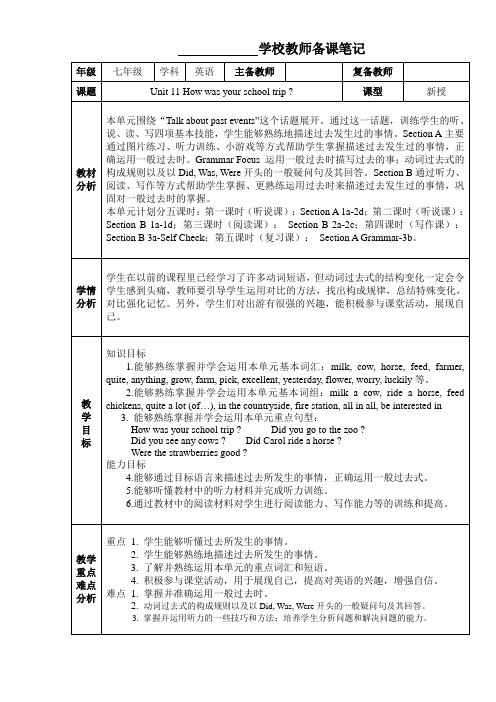
新授
教材分析
本节课是在已学过的一般现在时态的基础上过渡到一般过去时。学生通过听说操练来掌握本课时的重点单词、短语、和语法。本节课有3个模块:模块一围绕“school trip”这一话题展开词汇教学及一般过去时(1a);模块二围绕“Carol’s visit to the farm”进行听说训练,听力(1b 2a 2b)、口语(1c 2c);模块三围绕“Peter’s and Eric’s trips”(2d)以结对活动形式进行操练。
Did they pick any strawberries on the farm ?
Yes, they did .
展开Pair work活动,完成l c部分口语交际的教学任务
自编对话,全班互查,错误更正
学生展开Pair work活动,主要操作和练习使用一般过去时的各种句式进行问答
熟练掌握目标语言
学情分析
学生在以前的课程里已经学习了许多动词短语,但动词过去式的结构变化一定会令学生感到头痛,教师要引导学生运用对比的方法,找出构成规律,总结特殊变化,对比强化记忆。另外,学生们对出游有很强的兴趣,能积极参与课堂活动,展现自己。
教
学
目
标
知识目标
1.能够熟练掌握并学会运用本单元基本词汇:milk, cow, horse, feed, farmer, quite, anything, grow, farm, pick, excellent, yesterday, flower, worry, luckily等。
课型
新授
教材分析
本单元围绕“Talk about past events”这个话题展开。通过这一话题,训练学生的听、说、读、写四项基本技能,学生能够熟练地描述过去发生过的事情。Section A主要通过图片练习、听力训练、小游戏等方式帮助学生掌握描述过去发生过的事情,正确运用一般过去时。Grammar Focus运用一般过去时描写过去的事;动词过去式的构成规则以及以Did, Was, Were开头的一般疑问句及其回答。Section B通过听力、阅读、写作等方式帮助学生掌握、更熟练运用过去时来描述过去发生过的事情,巩固对一般过去时的掌握。
新人教版七年级下第十二单元教案

新人教版七年级下第十二单元教案(总7页)--本页仅作为文档封面,使用时请直接删除即可----内页可以根据需求调整合适字体及大小--一、复习预习教师引导学生复习上节课所学含be的一般过去时态结构,导入本节课内容,并检查本节课预习作业。
二、知识讲解知识点1: last的用法【考查点】一 adj. 最后的;上一个的如:last weekend上一周He has lived here for the last few years. 过去的几年他一直住在这里。
【考查点】二v. 持续如: Our holiday lasts 10 days.我们的假期持续十天The hot weather lasted until September. 炎热的天气持续到九月。
知识点2:How interesting! 多么有趣呀!【考查点】一由"how"引导的感叹句:"how"意为"多么",用作状语,修饰形容词或副词(被强调部分)。
如果修饰形容词,则句中的谓语动词用系动词;如果how修饰副词,则句中的谓语动词用行为动词,这类句子的结构形式常是:How+adj.(adv.)+主语+谓语+(it is).如:① How cold it is today! 今天多么冷呀!② How nice the pictures are! 多么漂亮的图画呀!③ How happy they look! 他们显得多么高兴呀!【考查点】二由"what"引导的感叹句:"what"意为"多么"用作定语,修饰名词(被强调部分),单数可数名词前要加不定冠词a/an,复数可数名词或不可数名词前不用冠词。
这类句子的结构形式常是: what+(a/an)+adj.+n.+主语+谓语+(it is).如:① What a clever girl she is! 多么聪明的姑娘呀!② What an interesting story it is! 多么有趣的故事呀!③ What good children they are! 他们是多么好的孩子呀!知识点3 : camp by the lake 在湖边野营【考查点】一 .camp v/n如:go camping 去野营 summer camp 夏令营【考查点】二.by prep.如:by the river 在湖边 by bus 乘车知识点3: work as a guide 做导游【考查点】as 为介词,意为“作为,像”as 与like 二者都是介词,as表示“实际上是……”,like 表示“实际上不是……如:He talks to me as a teacher.He talks to me like my teacher.知识点4:a butrefly house with over 200 kinds of butterflies【考查点】介词 with 之用法1.与...一起,偕同,和...如:She lives with her son. 她和儿子住在一起。
最新新人教版七年级下册Unit11-12单元教案
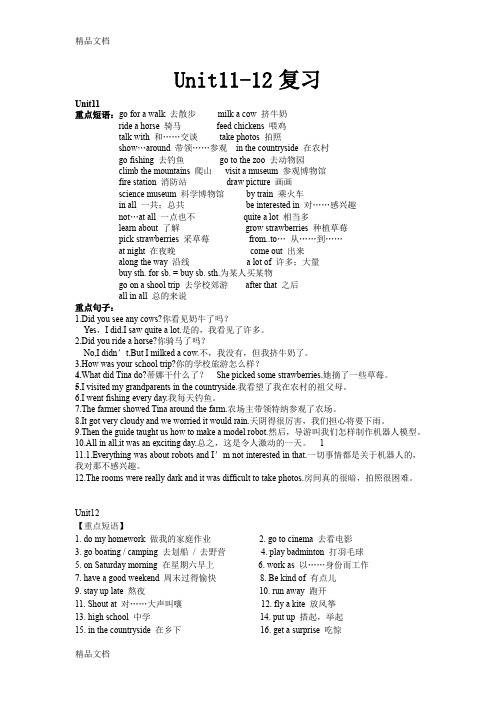
Unit11-12复习Unit11重点短语:go for a walk 去散步milk a cow 挤牛奶ride a horse 骑马feed chickens 喂鸡talk with 和……交谈take photos 拍照show…around 带领……参观in the countryside 在农村go fishing 去钓鱼go to the zoo 去动物园climb the mountains 爬山visit a museum 参观博物馆fire station 消防站draw picture 画画science museum 科学博物馆by train 乘火车in all 一共;总共be interested in 对……感兴趣not…at all 一点也不quite a lot 相当多learn about 了解grow strawberries 种植草莓pick strawberries 采草莓from..to…从……到……at night 在夜晚come out 出来along the way 沿线 a lot of 许多;大量buy sth. for sb. = buy sb. sth.为某人买某物go on a shool trip 去学校郊游after that 之后all in all 总的来说重点句子:1.Did you see any cows?你看见奶牛了吗?Yes,I did.I saw quite a lot.是的,我看见了许多。
2.Did you ride a horse?你骑马了吗?No,I didn’t.But I milked a cow.不,我没有,但我挤牛奶了。
3.How was your school trip?你的学校旅游怎么样?4.What did Tina do?蒂娜干什么了?She picked some strawberries.她摘了一些草莓。
- 1、下载文档前请自行甄别文档内容的完整性,平台不提供额外的编辑、内容补充、找答案等附加服务。
- 2、"仅部分预览"的文档,不可在线预览部分如存在完整性等问题,可反馈申请退款(可完整预览的文档不适用该条件!)。
- 3、如文档侵犯您的权益,请联系客服反馈,我们会尽快为您处理(人工客服工作时间:9:00-18:30)。
Unit11-12复习Unit11重点短语:go for a walk 去散步milk a cow 挤牛奶ride a horse 骑马feed chickens 喂鸡talk with 和……交谈take photos 拍照show…around 带领……参观in the countryside 在农村go fishing 去钓鱼go to the zoo 去动物园climb the mountains 爬山visit a museum 参观博物馆fire station 消防站draw picture 画画science museum 科学博物馆by train 乘火车in all 一共;总共be interested in 对……感兴趣not…at all 一点也不quite a lot 相当多learn about 了解grow strawberries 种植草莓pick strawberries 采草莓from..to…从……到……at night 在夜晚come out 出来along the way 沿线 a lot of 许多;大量buy sth. for sb. = buy sb. sth.为某人买某物go on a shool trip 去学校郊游after that 之后all in all 总的来说重点句子:1.Did you see any cows?你看见奶牛了吗?Yes,I did.I saw quite a lot.是的,我看见了许多。
2.Did you ride a horse?你骑马了吗?No,I didn’t.But I milked a cow.不,我没有,但我挤牛奶了。
3.How was your school trip?你的学校旅游怎么样?4.What did Tina do?蒂娜干什么了?She picked some strawberries.她摘了一些草莓。
5.I visited my grandparents in the countryside.我看望了我在农村的祖父母。
6.I went fishing every day.我每天钓鱼。
7.The farmer showed Tina around the farm.农场主带领特纳参观了农场。
8.It got very cloudy and we worried it would rain.天阴得很厉害,我们担心将要下雨。
9.Then the guide taught us how to make a model robot.然后,导游叫我们怎样制作机器人模型。
10.All in all,it was an exciting day.总之,这是令人激动的一天。
111.1.Everything was about robots and I’m not interested in that.一切事情都是关于机器人的,我对那不感兴趣。
12.The rooms were really dark and it was difficult to take photos.房间真的很暗,拍照很困难。
Unit12【重点短语】1. do my homework 做我的家庭作业2. go to cinema 去看电影3. go boating / camping 去划船/ 去野营4. play badminton 打羽毛球5. on Saturday morning 在星期六早上6. work as 以……身份而工作7. have a good weekend 周末过得愉快8. Be kind of 有点儿9. stay up late 熬夜10. run away 跑开11. Shout at 对……大声叫嚷12. fly a kite 放风筝13. high school 中学14. put up 搭起,举起15. in the countryside 在乡下16. get a surprise 吃惊17. make a fire 生火18. each other 互相19. so…that…如此……以至于……20. go to sleep 入睡21. the next morning 第二天早上22. look out of…向……外看23. shout to 冲……呼喊24. up and down 上上下下25. wake…up 把……弄醒26. move into…移进……26.look out of 向外看【重点语法】1. go + doing 去做某事2. play + 球类玩……球3. 时间段+ ago ……前4. keep + sb. / sth. + 形容词/ 副词/ 介词短语使……保持……5. so + 形容词/ 副词+ that 句子如此……以至于……6. see sb. doing sth. 看见某人正在做某事7. let sb. do sth. 让某人做某事8. start to do / doing sth. 开始做某事9.tell sb about sth. 告诉某人做某事【重点句子】1. —What did you do last weekend? 上个周末你做什么了?—I did my homework. / We went boating. 我做了我的家庭作业。
/ 我们去划船了。
2. —Who visited her grandma? 谁看望了她的奶奶?—Becky did. 贝姬看望了。
3. My sister finished high school two weeks ago.我的姐姐两周前中学毕业了。
4. But I was so tired that I went to sleep early.但是我是如此疲倦,以至于我很早就睡着了。
31.Where did she go last weekend? She went to a farm. 上周末她去哪里了?她去了农场。
32.Who did she go with? She went with her classmates. 她跟谁去?她跟她朋友一起去。
Unit11重点单词和短语用法1、milk的用法:milk即可作动词,也可作名词。
作名词时,意为“牛奶”;作行为动词时,意为“挤奶”。
试译:给奶牛挤奶_____2、代词anything的用法:anything是不定代词,意为“任何事情;任何东西”,常用于否定句及疑问句中,与something同义,但something 常用于肯定句中。
用something, anything 填空。
(1)There’ _____ wrong with your eyes.(2) Is there _____ important in today’s newspaper?3、worry 的用法:worry是行为动词时,意为“担心;着急;焦虑”,常与介词about 连用,意为“对……感到担心”,其形容词为worried(担心的,焦急的),过去式为worried。
用worry的正确形式填空。
(1)Tom, don’t ____about your per dog.(2) I ____about my little daughter very much last night.4、A、动词的过去式变化规则:1.直接加ed: work—worked, look—looked, play--played2.以不发音的e结尾的单词,直接加d: live—lived, hope--hoped3.以辅音字母+y结尾的单词,变y为i加ed: study—studied, carry—carried, worry--worried4.以元音字母+y结尾的,直接加ed: enjoy—enjoyed, play--played5.以重读闭音节结尾的,双写最后的辅音字母+ed: stop—stopped, plan--planned不规则变化的动词过去式:不规则动词的过去式:go 过去式:went ride 过去式:rodefeed 过去式:fed take 过去式:tookdo 过去式:did is/was过去式:wasare 过去式:were see 过去式:sawsay过去式:said have过去式:hadbuy 过去式:bought buy 过去式:boughthear 过去式:heard teach 过去式:taughtcome 过去式:came get 过去式:gotgrow 过去式:grew eat 过去式:atedraw 过去式:drew练习I.单项选择。
()1. ____ the weather yesterday?A. How’sB. How wasC. What was()2. ____ he ____ TV every day?A. Did; watchedB. Does;watchC. Does; watched ( ) 3. ____ is free(免费的) here. We all like playing here.A. SomethingB. AnythingC. Everything( ) 4. I like ____ train because I can watch the scenes more easily along the road.A. slowB. fastC. tall( ) 5. —_____—It was exciting and interesting.A. How’s its going?B. Did you have a good trip?C. How was your school trip?B 一般过去时态的特殊疑问句1. 特殊疑问词+ was/were + 主语+ 其他?上个周末你过得怎么样?_______ _______ your last weekend?2. 特殊疑问词+ did + 动词原形+ 主语+其他?昨天他做了什么事情?_____ ____ he do yesterday?练一练:对下列句子中的划线部分提问。
1. I got up at nine yesterday morning._____ ______ you get up yesterday morning?2. We did our homework last night.______ ______ you _______ last night?3. They were in the supermarket last Sunday.______ _______ they last Sunday?4. My last weekend was kind of boring.______ _____ your last weekend?5. Linda took a walk with her parents after dinner._____ ____ Linda take a walk with after dinner?5、形容词exciting的用法:exciting为形容词,意为“令人兴奋,激动的”。
